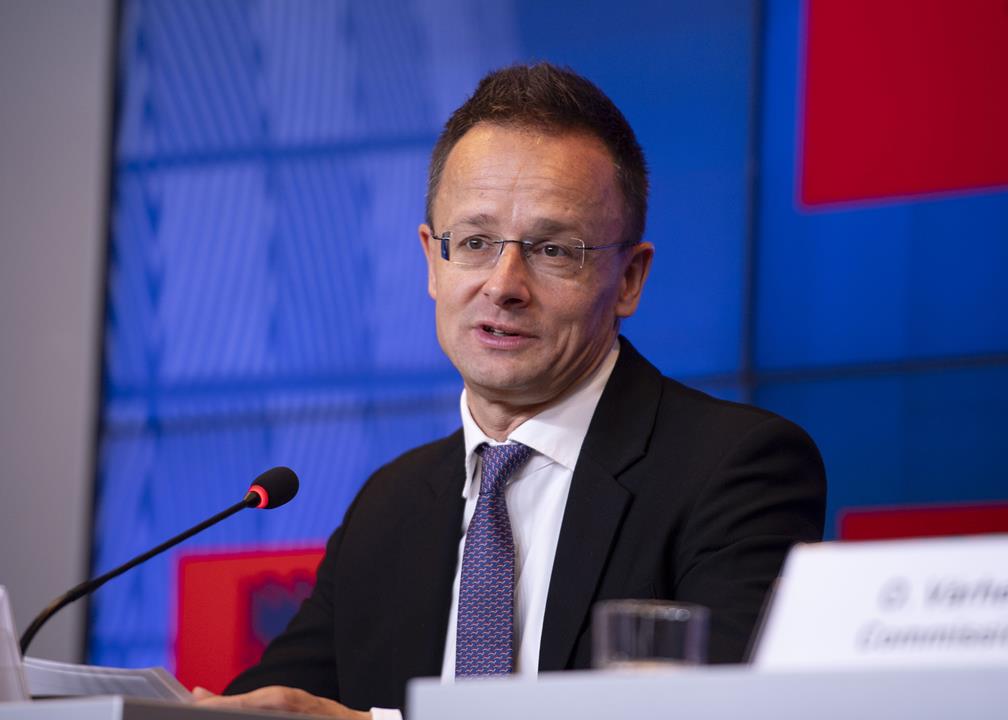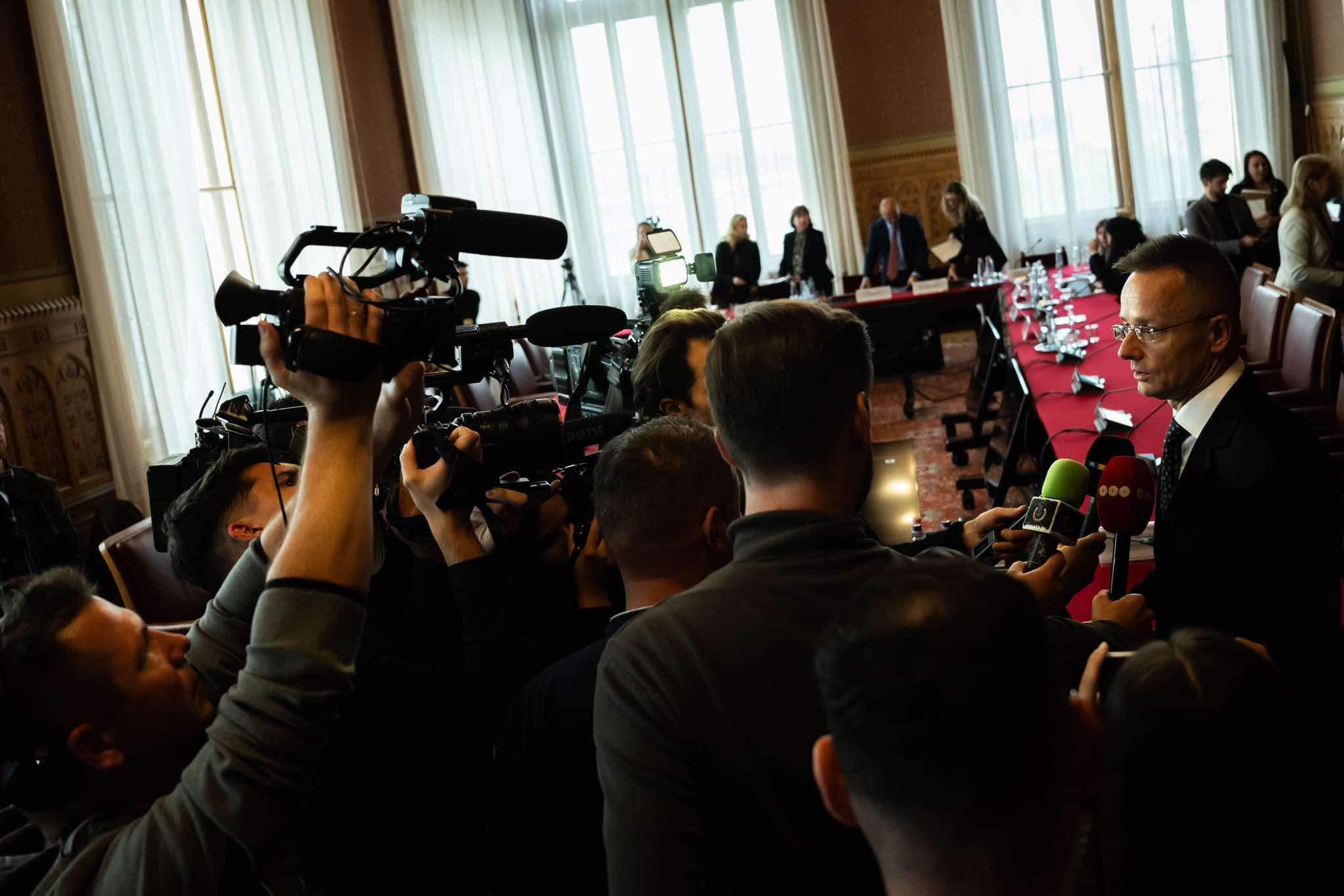Admitting Ukraine to NATO would cross a Hungarian “red line” since this would lead to a third world war, the foreign minister said, briefing parliament’s foreign affairs committee on Thursday.
Ukraine’s NATO accession is crossing “red line”
The accession of Ukraine at war would lead to a direct confrontation between Russia and the alliance, Péter Szijjártó, said in response to MPs’ questions.
Several allies had encouraged Ukraine to believe in its prospective NATO membership, which he called “a humiliation of Ukraine” since in closed NATO sessions it was generally agreed that “this is not possible”.
Meanwhile, he said Hungary opposed military advisers from the European Union in Ukraine because sending them would lead to escalation.

Also, he said Hungary rejected extending the review period of the sanctions against the Central Bank of Russia from six months to three years, because doing so would raise public expectations of a never-ending war “which we find unacceptable”.
The USA continues to trade with Russia
When it comes to punitive measures that may harm national interests, Hungary objects to sanctions on, for example, natural gas and nuclear fuel, adding that many slammed Hungary in this regard, yet European imports of Russian liquefied natural gas (LNG) had grown by 11 percent in the first half of the year, while France alone had increased Russian LNG import volume by 110 percent.
Regarding Russian crude, he said Hungary vetoed the EU measure to ban crude imports, and Hungary, Slovakia and Czechia had won an exemption accordingly. Meanwhile, India, “if I recall correctly”, increased Russian crude oil imports twenty-fold, while Europe’s oil imports from India had tripled, he added.
Last year, Szijjártó said, the US continued to rely on Russian supplies of uranium, yet Hungary was accused of being pro-Russian in light of the project to expand its Paks nuclear power plant in which US, German, French, and Austrian subcontractors worked alongside Russian nuclear contractor Rosatom.

Hungary’s foreign policy goals peace, sovereignty, economic neutrality, says Szijjártó
The primary goals of Hungary’s foreign policy are to promote peace, protect national sovereignty and preserve the country’s economic neutrality, Szijjártó said. Speaking at a hearing of parliament’s foreign affairs committee, Szijjártó said Hungary had been paying the price of the war raging in Ukraine for two and a half years.
“After a thousand days, the European political elite should realise that the question is not what we think about the war, because everyone knows that exactly; the question is how to ensure peace, or more precisely, which path will lead to peace the fastest,” he said. The minister said the pro-war stance followed so far had failed, and weapons deliveries had not brought the end of the conflict closer, so it would be time to give pro-peace policy a chance in order to avoid escalation and a direct confrontation between NATO and Russia.
He insisted that outside of the “transatlantic bubble”, pro-peace forces were in the majority, and Hungary was also part of this majority, even if those who held this position were called “Putin’s puppets or Kremlin propagandists” in Europe. Szijjártó went on to point to what he considered attempts to limit national sovereignty in many parts of the world, including Hungary.
The EU wants to say who and how should govern in Hungary
“Last week, we all had the chance to watch the debate in the European Parliament in Strasbourg, where the wish of who should be in government, who and how should govern in Hungary, was expressed more clearly and more shamelessly than ever before,” he said. “I believe that such an attempt at open intervention is unprecedented, even in the recent history of European politics, and must be rejected as firmly as possible. It is not up to international political actors, Manfred Weber or Ursula von der Leyen, to decide who governs in Hungary, but Hungarian voters,” Szijjártó added.
Finally, the minister touched on the issue of trade neutrality, reiterating that Hungary was against the formation of blocs and against launching a new trade “cold” war. Instead, was is interested in connectivity and creating trade ties, he said. He cited Hungary as an example of the growth potential held by civilised East-West cooperation, insisting the country had become a key hub for Eastern and Western economies thanks to its “pragmatic, patriotic foreign policy”.
Foreign minister presented economic neutrality policy to WTO deputy DG
Szijjártó presented the Hungarian government’s strategy of economic neutrality to World Trade Organization (WTO) Deputy Director-General Xiangchen Zhang in Geneva on Wednesday, his ministry said in a statement. In a post on social media after the meeting, Szijjártó said some of the biggest players in global politics and world trade had taken decisions that could lead to the outbreak of an “economic cold war”.
“This flies in the face of Hungary’s interests. The Hungarian economy is export-oriented, Hungarian companies are competitive at the international level, and their export performance is increasing from year to year, so it is in Hungary’s interest for world trade and the global economy to operate without impediment,” he added. “We have shown in recent years how much we can profit from a civilised cooperation between East and West,” he said, adding that Hungary had become a “meeting point” for investments from the East and West.
He pointed to the “unhindered cooperation” between German and Chinese automotive industry companies in Hungary and said the success of entire European economies depended on such cooperation. Szijjártó said the WTO deputy director-general had approved of Hungary’s strategy of economic neutrality, calling it “the right way”. That strategy produces economic growth, creates jobs and higher wages, Szijjártó added.
Read also:
The head if NATO, Rutte keeps promising Ukraine membership. Even the US said that it will veto Ukraine’s acceptance until such time peace is settled between Russia and Ukraine. I believe there are rules for membership acceptance. These rules must be observed.
Dear Marta. I agree, Nato can not invite a country currently on war, on the other hand, lets assume the war ends in X condition. Russia is asking to avoid Ukraine membership to NATO just like it did with Georgia. What do you think is the solution? Russia says they dont want NATO expansion to their front door. But NATO in an essence is not “expanding” juts like a country. the 3rd party countries asks to join, and is a defence alliance. i dont understand the russian no sense. they think they can mandate (just like the USA) over weaker countries. I dont like NATO, it should not exist, the EU should do this kind of self defence alliance without the help of USA